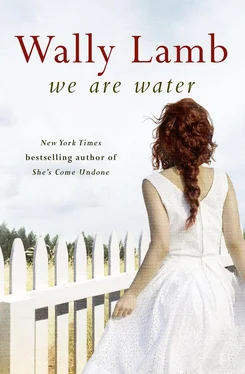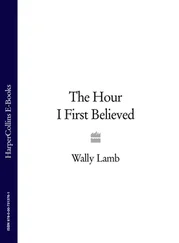“He told me his name. Placed his box on the floor and shook my hand. His was twice the size of mine, and as rough as sandpaper. ‘You the one they told me to come and see,’ he said. He didn’t identify who ‘they’ were and I didn’t ask. He picked up his box and held it at arm’s length, expecting me to take it. ‘These are some of my pictures. You want to look at them?’
“I told him this wasn’t really a convenient time. Could he come back some day the following week? He shook his head. He worked, he said. He could leave them here. I was hesitant, suspecting that he had no more talent than the Sunday painters who often contacted me—dowagers and dilettantes, for the most part, who became huffy when I failed to validate their assumptions of artistic genius. I didn’t want to be the bearer of bad news. Still, I could tell that it had cost him something to come here, and I didn’t want to disappoint him either. ‘Tell you what,’ I said. ‘You see that table over there where the punch bowl is? Slide your box underneath it. I’ll look at your work when I have a chance and get back to you. Do you have a telephone?’
“He shook his head. ‘But you can call my boss when you ready to talk, and he can tell me. I don’t know his number, but he in the phone book. Mr. Angus Skloot.’
“‘The building contractor?’ He nodded. The Skloots were generous donors to the museum, and Mrs. Skloot was a member of the Friends. ‘Okay then, I’ll be in touch.’ He thanked me for my time. I told him to help himself to punch and cookies, but when he looked over at the refreshments table and saw several of the other attendees staring back at him, he shook his head.
“He stayed for a little while longer, repelling the crowd wherever he wandered, as if he were Moses parting the Red Sea, but unable to resist the art he would stop before and study. As I watched him walk finally toward the exit, Marietta approached me. ‘I’m dying of curiosity, Gualtiero,’ she said, her mouth screwed up into a sardonic half-grin. ‘Who’s your new colored friend?’
“I stared at her without answering, waiting for her to stop smirking. When she did, I said, ‘He’s an artist. Isn’t that the reason the Friends of the Statler exists? To support the artists of our community?’ She nodded curtly, pivoted, and walked away.
“The opening ended at five P.M. I escorted the last of the guests to the door. The caterers packed up the punch bowl and cookie trays, folded the tablecloth, and moved the table they’d used back to its proper place at the entrance to the exhibit. The janitors stacked the folding chairs and began to sweep. And there it was, by itself in the middle of the floor: Jones’s box. I carried it upstairs to my office. Then I put my coat on, went downstairs, and locked up the building on my way out. For the rest of that weekend, I forgot all about Josephus Jones.
“But on Monday morning, there it was again: the box. I opened it, removed Jones’s two dozen or so small paintings, and spread them across my work counter. He’d used what looked and smelled like enamel house paint. Two of the works had been painted on plywood, another on Masonite board. The rest were on cardboard. The tears in my eyes blurred what was before me.”
“And what was before you?” Miss Arnofsky asks. “Can you describe what you saw?”
“Well, he had no understanding of perspective; that was immediately apparent. Many of the figures that populated his paintings were out of proportion. He knew nothing about the technique of chiaroscuro; there was no play between shadow and light in any of his samples. Nevertheless, he had an intuitive sense of design and a wonderful feeling for vivid color. His subject matter—cowboys and Indians, jugglers and jungle animals, tumbling waterfalls, women naked or barely clothed—possessed all the characteristics of the modern primitive. Yet each gave evidence of a unique vision. And Josephus Jones was indeed a narrative painter; his pictures suggested stories that celebrated the rustic life but warned of sinister forces that lurked in the bushes and behind the trees.
“I called Angus Skloot, who told me where Joe was working that day. And so I carried his box of paintings out to my car and drove to the building site. Joe introduced me to his brother, Rufus; the two were building a massive stone fireplace inside the unfinished house. I suggested we talk outside so that I could deliver the good news about his artistic talent.
“He must have been thrilled to receive it,” my guest says.
“No, quite the contrary. He was unsurprised, unsmiling; it was as if he already knew what I had to tell him. I asked him how long he’d been painting. About three years, he said. Told me he’d begun the day he awoke from a dream about a beautiful naked woman riding on the back of a lion. He had grabbed a carpenter’s pencil and a piece of wood, he said, so that he could draw his dream before it faded away like fog. He wanted to remember it, but he wasn’t sure why. All that day, he said, he thought about the woman astride the lion. And so, at the end of his workday, he got permission from Mr. Skloot to take some of the almost-empty cans from the paint shed. Then he’d gone home and painted what he had first dreamt and then sketched out. He said he had been painting ever since. I handed him back his box of paintings and he placed it on the ground between us. ‘Tell me about yourself,’ I said. He looked suspicious, I remember. Asked me what it was I wanted to know. ‘Whatever you want to tell me,’ I said.”
“And what did he want to tell you?” Miss Arnofsky asks. “I realize that this was years ago, but it would be helpful to me if you can recall it as accurately as possible.”
It’s strange what happens next. When a painting I’m working on becomes my singular focus—when I am “in the zone,” as I’ve heard people put it—a trancelike state will sometimes overtake me. And now it’s happening not with my art but with my memory. Seated across from me, Miss Arnofsky fades away and the past becomes more alive than the present …
Joe scuffs his work boot against the ground and takes his time thinking about it. “Well, my granddaddy on my daddy’s side was a slave on a Virginia tobacco farm and my grams was a free woman.” After the emancipation, they moved up to Chicago and his grandfather got work in the stockyards. His mother’s people were third-generation Chicagoans, he says. “Mama washed rich ladies’ hair during the week at a fancy hotel beauty parlor downtown, and on weekends she preached in the colored church. My daddy worked in the stockyards at first, like his daddy did. But sledgehammerin’ cows between the eyes to get them ready for slaughter give him the heebie-jeebies, so he quit. Got work at a brickyard and become a mason—a damn good one, too. When me and Rufus was thirteen and fourteen, Daddy started bringing us along on jobs, and that was how we learnt to work with stone and mortar ourselfs.” His father was a better mason than he is, Joe says, but Rufus is better than both of them. “He a artist uses a trowel and ce -ment instead of a paintbrush is what Mr. Skloot told him,” Joe says, smiling broadly. “And thass about right, too.”
I ask him how long he’s lived in Three Rivers. Since 1953, he says, and when I tell him that was the year my family and I moved here, too, his eyes widen, then slowly lock onto mine. He nods knowingly, as if our having arrived in Three Rivers at the same time is more about fate than coincidence.
Both of his parents had passed by then, he tells me, and Rufus had just gotten out of the navy. He urged Joe to come east because he had a plan. They would get good jobs at the shipyard in Groton, helping to build America’s first nuclear submarine, the U.S.S. Nautilus . But the shipbuilders had shied away from hiring coloreds, fearing repercussions and race baiting from their white workers. “So we took whatever jobs we could find. Worked tobacco up in Hartford, worked at a sawmill, dug graves. We took masonry jobs when we could find them, which was just this side of never. The luckiest day of our life was the day Mr. Skloot come to visit his sister’s stone at the cemetery up in Willimantic,” he says. “Rufus and me was digging a grave two plots down, and he come over and the three of us got to talking. Mr. Skloot’s face lit up when we told him we was gravediggers for right now but masons, mostly. He said he’d just fired his mason for being drunk on the job. Well, sir, by the time he got back in that big ole black Oldsmobile of his and drove away, we had us jobs with Skloot Builders. We was spoze to be on trial for a month so Mr. Skloot could see what kind of work we done, and if we was hard workers and dependable, and didn’t get liquored up. But we got hired permanent after just the first week because Mr. Skloot liked what he seed us do—well, Rufus’s work more than mines, but mines, too.”
Читать дальше












